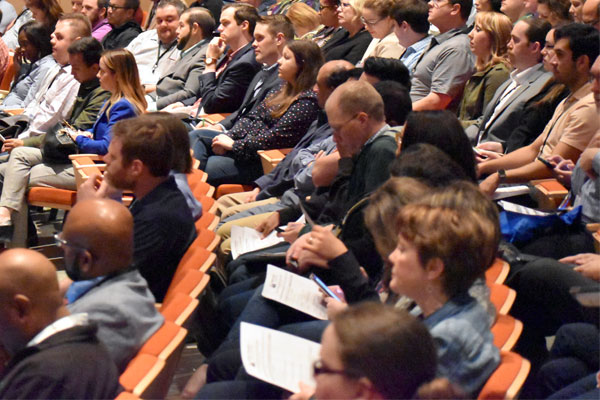
Top fraud professionals gather to share experiences, lead workshops and network.
The Fraud Summit, put on annually by the Jindal School’s Center for Internal Auditing Excellence, gathers professionals interested in the latest trends in fraud schemes and fraud prevention.
The two-day summit also offers continuing professional education through workshops and a general conference. The workshops offer 8 hours of CPE credit, and the conference offers another 8 hours of CPE credit.
Experts Warn of Fraud’s New Sophistication
Today, there are countless scams designed to separate people from their money that calls for a higher degree of diligence and skepticism than ever before, said former top-flight FBI agent, Eric O’Neill.
O’Neill, who helped capture the most notorious spy in U.S. history and the real-life hero behind the movie Breach, addressed nearly 400 professionals in the internal auditing field recently at the 2009 UT Dallas Fraud Summit.
As a partner with the Georgetown Group, a fraud investigative and consulting firm, O’Neill now draws on the same investigative acumen he used as an FBI counterintelligence operative to assist clients in the private sector.
“What happened to an honest wage for an honest day’s work?” O’Neill said. “If there’s a way to cheat you out of your money, someone’s going to do it, and that’s why as a society, we’ve become people with our guards way up.”
O’Neill told the group that when the economy weakens, fraudulent activity strengthens, and fraudsters exploit people who are more vulnerable and desperate for help and cash.
“Think of the old axiom: Desperate times call for desperate measures. We’re certainly in desperate times, fraud is on the rise, and I don’t see it stopping any time soon,” O’Neill said.
O’Neill said technological advances have made fraud “easier, more pervasive and more persuasive.” The power of the Internet and information technology has helped cybercriminals recycle and perfect older ploys, such as bogus work-at-home schemes, while designing thousands of new ones.
“It’s just as easy now for someone in Dallas, Texas, to defraud you as it is for someone sitting in Belarus or anywhere around the world, because all they need is a computer and Internet access,” he said.
On the corporate side, economic espionage poses the greatest threat as fraudsters attempt to steal companies’ greatest asset – their intellectual property. Fraudsters comb web sites and marketing material, review filings with regulatory agencies and scan trade floor conferences looking for any information that grants them access to a company’s intellectual property.
“Occasionally a vendor will put out information that they might not have wanted to release. You’d be amazed how many clients will put things on the web site because they want to look really special and unique, and they forget that they’ve just given their (intellectual property) to the world,” O’Neill said.
“We’ve all sort of become like business and financial 4-year-olds,” O’Neill said. “Don’t speak to strangers. … Don’t take candy from Bernie Madoff. Don’t accept a car ride from Robert Hanssen. Turn and run away from telemarketers,” O’Neill told the audience.
“We are in the age of diligence … You must know who you’re dealing with and discover a way to trust them. This isn’t really about fraud. It’s about trust, so be a little bit paranoid. A little bit of paranoia can be a great asset,” O’Neill said.
The Fraud Summit is held annually and is sponsored by UT Dallas School of Management’s Center for Internal Auditing.
